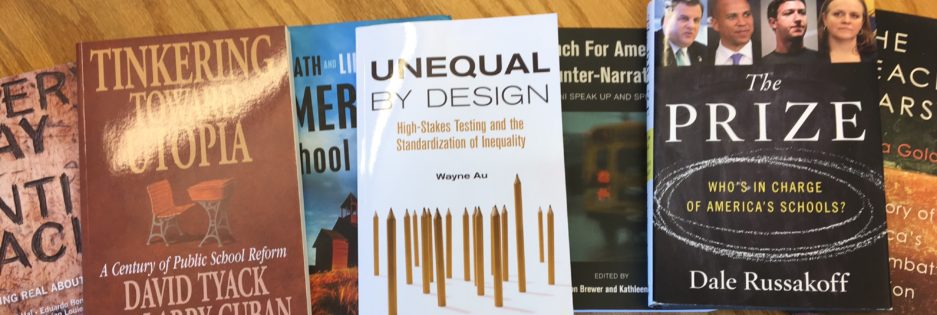Undergraduate students in Yale’s lecture course, “Public Schools Public Policy” 2017 were asked to complete group projects examining charter management organizations, entities that control a large number of charter schools. The majority of the group were selected from Getting Smart’s list of the 70 best charter chains.
Given this background, students were asked to answer the following two questions: How does the education provided by this CMO compare to the available public alternatives? What impact is this CMO having on public education? In their analysis, they collected federal, state, district and charter data in order to examine the history, pedagogy and mission, school demographics, student achievement, school discipline, accountability and oversight, funding, staffing, and relationship to the district.
Achievement First, Children Second? by Stephanie Addenbrooke, Miriam Cohen, Thomas Chu, José López.
Arizona’s BASIS for High-Achieving Charter Schools by Alison Levosky, Amalia Ono, Esteban Elizondo, and George Huynh
Aspire Public Schools, Akintunde Ahmad, Hannah Alexander, Franklin Eccher, Tran Le
Green Dot California Schools, by Grace Ambrossi, Nate File, Laura Lodono Pardo, Mariana Suarez-Riebeling
Gulen Schools: One of America’s Largest and Most Controversial CMOs by Edgar Aviña, Shoshana Davidoff-Gore, Caitlin Dermody, Daniel Vernick
K12 Inc.: Virtually Failing our Students, by Sydney Babiak, Emily Patton, Jaclyn Price, and Billy Roberts
Knowledge is Power, but at a Cost: KIPP CMO Report, by Evelyn Torres Abundis, Amanda Crego-Emley, Otis Baker, Jorge Lema
National Heritage Academies: A Case Study of For-Profit Educational Management Organizations; by Brian Pok, Clare Carroll, Denzell Jobson, Eliza Scruton
Rocketship Schools: Taking Steps Towards Closing the Achievement Gap, by Layla Treuhaft-Ali, Emil Friedman, Lindsay Efflant, Jake Fender
STRIVE Preparatory Schools (Denver, CO) by Julie Zhu, Lucas Riccardi, Momo Chapa, Caroline Francisco
New York’s Success Academy Charter Schools: A Tentative Success, By Alejandra Corona-Ortega, Sara Harris, Elijah Mas, and Ben Wong
Final Policy Projects
As a final Education policy project, students had the choice to either 1) highlight a model working well 2) diagnose an area of education with problems 3) conduct an autopsy on a failed policy or 4) create a blueprint for an innovation.
Akitunde Ahmad, The Manhood Development Program
Alejandra Corono-Ortega, Bilingual Education in Connecticut: Failing Those Who Need Us
Alison Levosky, Restorative Justice through Arts Programs
Amanda Crego-Emley & Layla Treuhaft-Ali, Thinking Beyond the Deficit Model: Culturally Relevant Pedagogy and the Achievement Gap
Billy Roberts & Tom Chu, The Opposite of TFA: A National Teacher University to Build the Teaching Profession
Brian Pok, The Origin of Unions and their Application to Teachers
Caroline Francisco, Sex Ed in the Era of Trump: City-Led Reform and Standardization on a Scale that Works
Clare Carroll, How Inclusionary Housing in Sacramento has led to Integration in Neighborhoods and Schools
Daniel Vernick, Fighting for a Future: The Massachusetts ‘No on 2’ Campaign and Its Impact on Public Education Advocacy
Denzell Jobson, Is the Harlem children’s zone accomplishing its goal? Should HUD’s promise zone initiative be the future of American public education?
Evelyn Torres-Abundis, From No-excuses to social-emotional learning: a different approach for charter schools
Edgar Avina & Sydney Babiak, A Framework for Creating an Effective Afterschool Program for Social and Behavioral Skills
Elijah Mas, Low Income, High Success: Economically Disadvantaged Students at two Connecticut Public Schools
Emil Friedman, Massachusetts and the Charter Cap: Accountability, Balance, and Implications for the Nation
Emily Patton & Eliza Scrunton, Teaching for Two: Public Education and Pregnant Teens
Franklin Eccher, The Myth of the Rural Attainment Gap: Rural Access to Higher Education and the Problem of the Education Desert
George Huynh, Recruiting and Retaining Asian American Teachers
Grace Ambrossi, Rezoning NYC Public Schools: Parents of Color Resistance to Rezoning As a Means of Integration
Hannah Alexander & Laura Londono Pardo, Mentor for America: Exploring Unified Best Practices in After-School Mentoring Programs
Jaclyn Price, Building Failure Factories: How Pinellas County is failing its Black Students
Jorge Lema, The “New” NYC Renewal Schools Program
Jose Lopez, Final Policy Project: Bars for Bars
Julie Zhu, “Shopping for Schools” and the Perpetuation of Racial Segregation in Schools
Lindsay Efflandt, The Need for Higher Teacher Pay in Rural America: What’s Being Attempted, and How Wyoming is Doing it Right
Lucas Riccardi & Esteban Elizondo, What can we learn from the Perkins Act?: Assessing vocational schools’ performance standards and accountability measures
Mariana Suarez-Rebeling, Bilingualism’s Cry for Attention: how bilingualism can help curb the current wave of nationalism
Miriam Cohen, Community Schools: Addressing the Poverty Gap at Its Roots
Molly Ono, The Liminal Presence of Arabic in American Public Schools
Momo Chapa, Legislating School Climate: Examining LAUSD’s Suspension Ban
Nate File, Tracking – Policy Brief
Otis Baker, The Boys Are Back: All-Boys Education in New Haven and Beyond
Sarah Harris, Don’t Say Gay: Why States Are Erasing LGBTQ Students, and How They Have the Power to Change It
Shoshana Davidoff-Gore, AP Enrollment and Equity in New Haven Public High Schools
Stephanie Addenbrooke, Understanding the dyslexic drop-out: why students with learning disabilities graduate at a lower rate than their peers
Tran Le & Jacob Fender, How Housing Policies Serve as Education Policies
